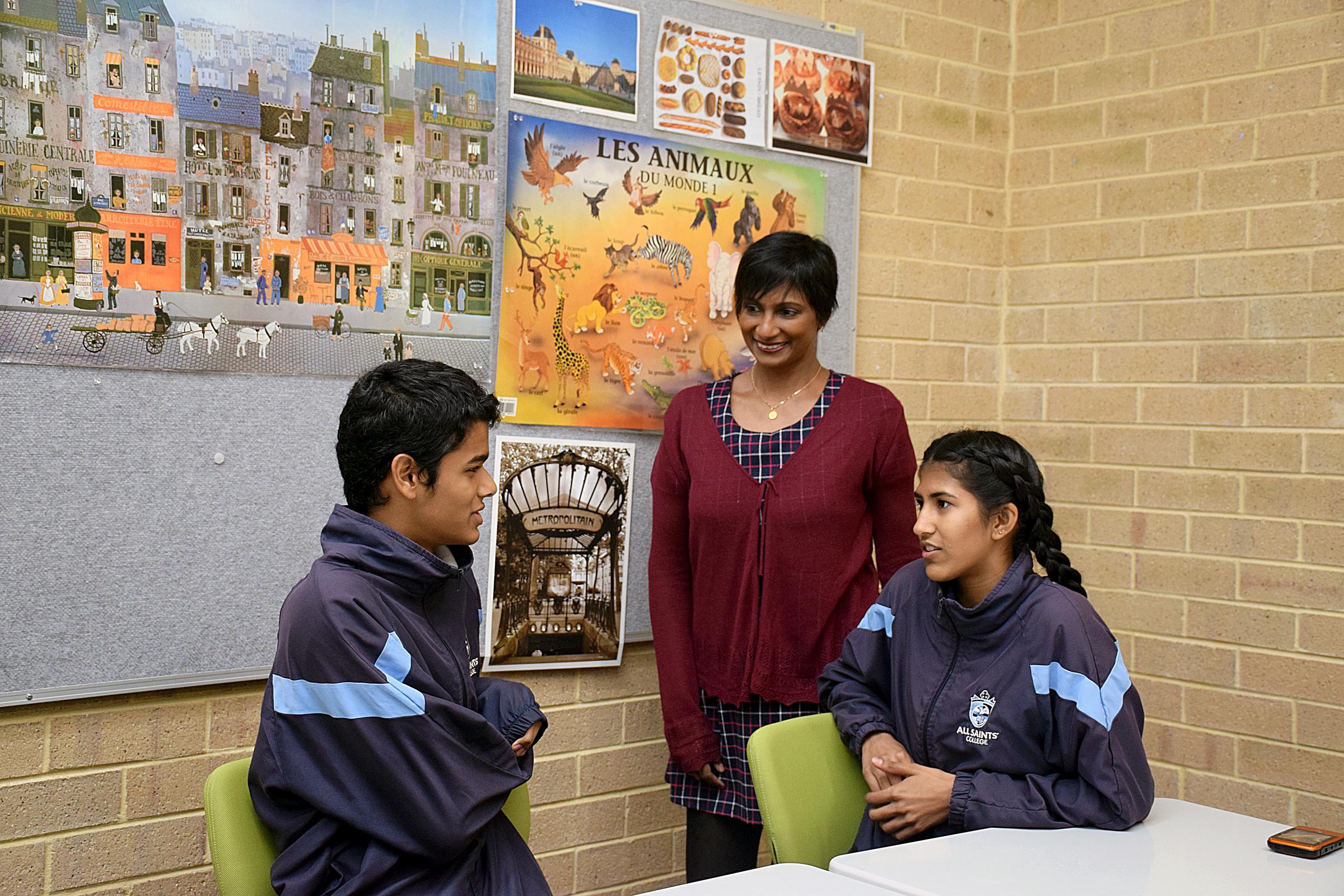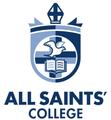LANGUAGES LEARNING AREA

FRENCH: SECOND LANGUAGE – ATAR COURSE and/or
VOCATIONAL EDUCATION AND TRAINING (VET) PATHWAY – CERTIFICATE III IN APPLIED LANGUAGE
An ability to communicate in French provides opportunities for students to learn about the rich and diverse French culture, traditions and belief systems. In the French course, students analyse, process and respond to texts to understand aspects of the language and culture of a range of French-speaking communities throughout the world.
The French: Second Language ATAR course is designed for students who do not have a French background—that is, students who have learnt the majority of the French they know in an Australian school or similar environment.
The VET pathway caters for second-language and background students. Certificate III in Applied Languages is achieved upon completion of Year 11 and Year 12 study of French. Students enrolled in Year 11 French can choose to pursue only the VET pathway or the ATAR pathway with the additional VET Certificate embedded in the ATAR course.
In the French course, students develop the skills and knowledge to communicate in French. Communication is facilitated through the achievement of four outcomes.
Outcome 1: Listening and responding
Outcome 2: Spoken interaction
Outcome 3: Viewing, reading and responding
Outcome 4: Writing
Note: To enrol in the Year 11 ATAR Units, students need to have successfully completed Year 10 French or equivalent.
There will be a charge for subscription to Language Perfect.
Year 11
Unit 1
The focus of this unit is C’est la vie! (That’s life!).
Unit 1 is organised around three learning contexts and a set of three topics:
| Learning Contexts | Topics |
The individual
| My daily routine Students reflect on their daily routine at home and school and popular activities: sport and socialising in their lives and the lives of young French people. |
The French-speaking communities
| French sports and leisure Students consider popular traditional and modern sports and leisure activities enjoyed by French people. |
The changing world
| Leading a healthy lifestyle Students consider current issues in the global community that relate to healthy living, the importance of physical activity and maintaining a well-balanced lifestyle. |
Unit 2
The focus of this unit is Voyages (Travel).
Unit 2 is organised around three learning contexts and a set of three topics:
| Learning Contexts | Topics |
The individual
| My travel tales and plans Students reflect on their own travel tales and discuss what is essential when planning a trip and travelling at home and abroad. |
The French-speaking communities
| Australia as a travel destination Students explore Australia as a destination for French-speaking travellers and discuss how they would prepare a French speaker for a trip to Australia. |
The changing world
| Travel in a modern world Students consider how technology is changing world travel, influencing the way people plan their holidays, and how they communicate with others while away. |
Year 12
Unit 3
The focus of this unit is Les médias (The media).
Unit 3 is organised around three learning contexts with a number of prescribed topics:
| Learning Contexts | Topics |
The individual
| Technology and me Students reflect on the role of technologies in their lives and in the lives of young people in French-speaking communities. |
The French-speaking communities
| Film and Music Students develop an insight into the cultures and lifestyles of the French-speaking communities through examples of francophone films, film clips and music. |
The changing world
| In the media Students consider the media and its impact on the global community. |
Unit 4
The focus for this unit is Le monde qui nous entoure (The world around us).
Unit 4 is organised around three learning contexts with a number of prescribed topics:
| Learning Contexts | Topics |
The individual
| Planning my future Students reflect on their plans for the future. |
The French-speaking communities
|
ITALIAN: SECOND LANGUAGE – ATAR COURSE
The study of Italian is relevant to students in Australia because Italian is a strong community language: the history of Italian settlement in Australia can be traced to the First Fleet in 1788 and Italian-speaking communities in Australia continue to play a significant role in our society. Italy is also a major destination for Australian travellers. The Italian course develops the ability of students to communicate in Italian, understand aspects of the language and develop a greater respect for the Italian people, their rich and diverse culture, traditions and belief systems. The study of Italian may also provide opportunities for continued learning and for future employment and experience, both domestically and internationally, in areas such as public relations, commerce, hospitality, education, marketing, international relations, media and tourism.
The Italian course is designed for students who do not have an Italian background—that is, students who have learnt the majority of the Italian they know in an Australian school or similar environment. Communication is facilitated through the achievement of four outcomes.
Outcome 1: Listening and responding
Outcome 2: Spoken interaction
Outcome 3: Viewing, reading and responding
Outcome 4: Writing
Note: To enrol in the Year 11 ATAR Units, students need to have successfully completed Year 10 Italian or equivalent.
There will be a charge for subscription to Language Perfect.
Year 11
Unit 1
The focus of this unit is Rapporti (Relationships).
Unit 1 is organised around three learning contexts and a set of three topics:
| Learning Contexts | Topics |
The individual
| Family, friend and school relationships Students reflect on the different relationships in their lives and consider the importance of friendship in their lives and the lives of young Italians. |
The Italian-speaking communities
| Traditions, events and celebrations Students explore Italian traditions, events and celebrations, and how these promote a sense of community and an awareness of culture. |
The changing world
| Communicating in a modern world Students consider how the internet, mobiles, social networking and other technologies impact on the lives of young people around the world. |
Unit 2
The focus of this unit is Andiamo! (Travel-let’s go!)
Unit 2 is organised around three learning contexts and a set of four topics:
| Learning Contexts | Topics |
The individual
| My holiday tales and plans Students reflect on their own holiday tales and discuss what is essential when planning a trip and travelling at home and/or abroad. Destination Italy Students explore travelling in a particular Italian region or city and explore tourist attractions and cultural experiences. |
| The Italian-speaking communities | Destination Australia Students explore Australia as a destination for Italian-speaking travellers and discuss how they would prepare an Italian speaker for a trip to Australia. |
The changing world
| Travel in a modern world Students consider how technology is changing world travel, influencing how people plan their holidays and communicate while they are away. |
Year 12
Unit 3
The focus for this unit is Grazie Italia (Thank you Italy).
Unit 3 is organised around three learning contexts and four prescribed topics:
| Learning Contexts | Topics |
| The individual | All things Italian Students reflect on the place of things Italian in their lives and in their community. |
| The changing world | Made in Italy around the world Students consider Il Made in Italy as a global brand and explore the contribution of Italians. |
| The Italian-speaking communities | Italian lifestyle Students explore the lifestyle, interests and activities in the everyday life of Italians. |
Unit 4
The focus for this unit is Ieri, oggi e domani (Yesterday, today and tomorrow)
Unit 4 is organised around three learning contexts and four prescribed topics:
| Learning Contexts | Topics |
| The Italian-speaking communities | Youth issues Students explore issues faced by Italian youth: health and body image, peer pressure, unemployment and drugs. |
JAPANESE: SECOND LANGUAGE – ATAR
This course gives students a broader and deeper understanding of the Japanese language and extends and refines their communication skills. It can connect to the world of work, further study and travel. It also offers opportunities for students to participate in the many sister school and student exchange programs between Western Australia and Japan. The Japanese: Second Language ATAR course is designed to equip students with the skills needed to function in an increasingly globalised society, a culturally and linguistically diverse local community, and to provide the foundation for life-long language learning.
The Japanese: Second Language course is aimed at students for whom Japanese is a second, or subsequent, language. These students have not been exposed to, or interacted in the language outside of the language classroom. They have typically learnt everything they know about the Japanese language and culture, through classroom teaching in an Australian school, or similar environment.
The Japanese: Second Language ATAR course is designed to facilitate achievement of the following outcomes:
Outcome 1 – Listening and responding
Outcome 2 – Spoken interaction
Outcome 3 – Viewing, reading and responding
Outcome 4 – Writing
Note: To enrol in the Year 11 ATAR Units, students need to have successfully completed Year 10 Japanese or equivalent.
There will be a charge for subscription to Language Perfect.
Year 11
Unit 1
The focus of this unit is 日にち常じょう生せい活かつ (Daily life).
Unit 1 is organised around three learning contexts and a set of three topics.
| Learning contexts | Topics |
The individual
| My life私のAAEE生活EE(せいかつ) Students reflect on their home life and explore homestay experiences, including exchanging information about their personal and family profile, hobbies and interests. They describe typical rules and routines of home and school life. |
| The Japanese-speaking communities | Home life学校と家でのAAEE生活EE(せいかつ) Students explore home-stay, typical rules, routines, family life, school activities, making contact with visitors and making arrangements to meet within Japanese-speaking communities. |
| The changing world | Daily life AAEE生活EE(せいかつ)AAをくらべて Students consider the daily life of young people and how they exchange information and opinions. |
Unit 2
The focus for this unit is ようこそ、 私の国へ ! (Welcome to my country).
Unit 2 is organised around three learning contexts and a set of three topics.
| Learning Contexts | Topics |
The individual
| Welcoming a guestようこそ! Students reflect on welcoming a visitor, networking with friends, making arrangements to go out, entertaining at home, dining out and describing special occasions. |
| The Japanese-speaking communities | Seasonal activities and celebrations しきとイベント Students explore seasonal activities, celebrations, and giving and receiving on special occasions. |
| The changing world | Healthy lifestyles けんこう Students consider a healthy lifestyle in a changing world. |
Year 12
Unit 3
The focus of this unit is わかい旅行者りょこうしゃ (Young travellers).
Unit 3 is organised around three learning contexts and a set of three topics.
| Learning Contexts | Topics |
The individual
| Travel旅行 Students reflect on their own travel experiences, including highlights and problems, travel preparations: what to take, booking accommodation, transport options and sight-seeing. Part-time jobs and money アルバイトとお金 Students reflect on part time work, pocket money and saving and spending money. |
| The Japanese-speaking communities | Travel 旅行 Students explore travel in Japanese-speaking communities: preparation, accommodation, transport options, places of interest and typical travel experiences. |
The changing world
| Travel旅行 Students consider the importance of travel for young people. |
Unit 4
The focus of this unit is かこと未来みらい (Reflections and horizons).
Unit 4 is organised around three learning contexts and a set of three topics.
| Learning Contexts | Topics |
The individual
| This year and beyondAAEE |
